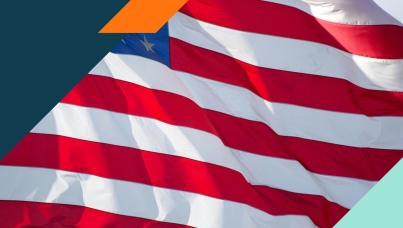

Americans critical of shutdown, steps to expand presidential power
Washington DC, November 3, 2025 – As the federal government shutdown continues, three in four Americans express concern over the shutdown, according to a new ABC News/Washington Post/Ipsos poll. Americans are also divided along party lines on who is more to blame for the government shutdown but blame President Donald Trump and Republicans in Congress slightly more than Democrats in Congress. Moreover, Americans feel that both major political parties are out of touch with the concerns of most people today.
At the same time, nearly two in three Americans feel Trump is going too far in trying to expand presidential power. This issue is sharply divided along party lines. The poll also finds that a majority of Americans oppose the Trump administration tearing down the east wing of the White House to make way for a 90,000 square-foot ballroom.
Detailed Findings
1. Concern over the federal government shutdown is high, and majorities of Americans see both parties as out of touch.
- Three in four Americans say they are concerned about the shutdown of the federal government (75%). Majorities of Democrats, Republicans, and independents alike are concerned.
- Americans are slightly more likely to say Trump and Republicans in Congress (45%) are responsible for the federal government shutdown than Democrats in Congress (33%). One in five are unsure which of the two is mainly responsible (22%).
- Two in three Americans say they feel the Democratic Party is out of touch with the concerns of most people in the United States today (68%). Slightly fewer, but still a majority, say the same of the Republican Party (61%).
2. Most Americans say efforts to expand presidential power have gone too far. However, this sentiment, as well as views on President Trump’s handling of key issues, remain sharply divided along party lines.
- A majority say Trump is going too far in trying to expand presidential power (64%), taking measures against his political opponents (58%), laying off government employees (57%), and changing how colleges and universities work (54%).
- Democrats and independents are more likely to say Trump is going too far on these issues. For example, 93% of Democrats and 70% of independents say Trump is going too far in trying to expand presidential power.
- Republicans are more likely to say Trump’s handling of these areas is about right, including on expanding presidential power (64%), deporting undocumented immigrants (61%), and sending the National Guard to patrol U.S. cities (66%).
- More than two in five approve of Trump’s handling of crime (44%) and immigration (43%). Trump has a lower approval rating on the economy (37%), managing the federal government (36%), and tariffs on imported goods (33%).
3. A majority of Americans oppose new renovations to the White House.
- Just over half of Americans (56%) oppose the Trump administration tearing down the east wing of the White House to make way for a 90,000 square-foot ballroom, compared to 28% who support the renovations and 16% who are not sure.
- Support is divided along party lines, with 62% of Republicans, 17% of independents, and 4% of Democrats voicing support for the renovations.
4. Americans are divided on who is more to blame for the risk of politically motivated violence in this country.
- One in three say the Republican Party is more to blame for the risk of politically motivated violence (34%), while 28% blame the Democratic Party and 28% say both are equally to blame.
- Majorities of Democrats and Republicans blame the opposing party (64% of Republicans blame the Democratic Party; 73% of Democrats blame the Republican Party). A plurality of independents say both parties are equally responsible (38%).
5. Most Americans say tariffs hurt the U.S. economy and inflation in the U.S.
- Overall, 63% think that the U.S. imposing tariffs on goods from other countries will hurt inflation in the U.S. In addition, majorities say tariffs will hurt the U.S. economy generally (58%) and hurt their own family’s financial situation (55%).
- Opinion also tilts negative when it comes to tariffs’ impact on U.S. manufacturing companies (28% help, 45% hurt) and people getting jobs in the U.S. (23% help, 42% hurt).
- When it comes to Americans’ assessments of their own household spending, large shares report spending more money on groceries (71%) and utilities (59%) compared to last year. Perceptions of year-over-year spending increases are less widespread for other areas, including housing (39%) and healthcare (43%).
Washington DC, October 30, 2025 – A new ABC News/Washington Post/Ipsos poll explores the public’s attitudes towards the economy, domestic affairs, and a number of key issues. The initial release of the poll finds that just over half of Americans (56%) oppose the Trump administration tearing down the East Wing of the White House to make way for a 90,000 square-foot ballroom, compared to 28% that support the renovations and 16% who are not sure.
Opinions vary widely based on party affiliation: 62% of Republicans, 17% of independents, and 4% of Democrats voice support for the renovations.
About the study
This ABC News/Washington Post/Ipsos poll was conducted from October 24 to October 28, 2025, by Ipsos using the probability-based KnowledgePanel®. Invitations were sent to 4,182 panelists, resulting in 2,725 completed interviews. In quality control, 73 respondents were removed for skipping half or more of the questions for which they were eligible or for completing the survey among the fastest 1 percent of interviews.
The survey was conducted using KnowledgePanel, the most well-established online probability-based panel that is representative of the adult U.S. population. Our recruitment process employs a scientifically developed addressed-based sampling methodology using the latest Delivery Sequence File of the USPS – a database with full coverage of all delivery points in the U.S. Households invited to join the panel are randomly selected from all available households in the U.S. Persons in the sampled households are invited to join and participate in the panel. Those selected who do not already have internet access are provided a tablet and internet connection at no cost to the panel member. Those who join the panel and who are selected to participate in a survey are sent a unique password-protected log-in used to complete surveys online. As a result of our recruitment and sampling methodologies, samples from KnowledgePanel cover all households regardless of their phone or internet status and findings can be reported with a margin of sampling error and projected to the general population. KnowledgePanel members receive a per survey incentive, usually the equivalent of $1 (though for some it is $2) in points, that can be redeemed for cash or prizes. Two email reminders were sent to hard-to-reach respondents. Hard-to-reach is defined as 18-29 years old, non-Whites, less than high school, did not vote in the 2024 presidential election, or self-identified as Republicans or lean Republicans. The remainder of the sample received one reminder email.
The study was conducted in both English and Spanish. The data were weighted to adjust for gender by age, race/ethnicity, education, Census region by metropolitan status, household income, language dominance, 2024 presidential vote choice and political party identification. The demographic benchmarks came from the 2025 March Supplement of the Current Population Survey (CPS) from the U.S. Census Bureau. Language dominance benchmark was from the 2023 American Community Survey (ACS). The 2024 presidential vote choice benchmark came from the federal elections 2024 election results for the U.S. President while the Party Identification benchmark came from the 2025 Pew’s National Public Opinion Reference Survey (NPORS). The weighting categories were as follows:
- Gender (Male, Female) by Age (18-29, 30-44, 45-59, 60+)
- Race-Ethnicity (White/Non-Hispanic, Black/Non-Hispanic, Other or 2+ Races/Non-Hispanic, Hispanic)
- Census Region (Northeast, Midwest, South, West) by Metropolitan Status (Metro, Non-Metro)
- Education (Less than high school, High School graduate or equivalent, Some College or Associate’s degree, Bachelor’s degree, Master’s degree or higher)
- Household Income (under $25K, $25K-$49,999, $50K-$74,999, $75K-$99,999, $100K-$149,999, $150K and over)
- Language Dominance (English Dominant Hispanic, Bilingual Hispanic, Spanish Dominant Hispanic, Non-Hispanic)
- 2024 Presidential Vote Choice (Trump, Harris, Someone else, Did not vote)
- Party Identification (Republican, Lean Republican, Not Lean/Refused, Lean Democrat, Democrat)
The margin of sampling error is plus or minus 1.95 percentage points at the 95% confidence level, for results based on the entire sample of adults. The margin of sampling error takes into account the design effect, which was 1.08. The margin of sampling error is higher and varies for results based on sub-samples. Sampling error is only one potential source of error. There may be other unmeasured non-sampling error in this or any poll. In our reporting of the findings, percentage points are rounded off to the nearest whole number. As a result, percentages in a given table column may total slightly higher or lower than 100%. In questions that permit multiple responses, columns may total substantially more than 100%, depending on the number of different responses offered by each respondent.
About Ipsos
Ipsos is one of the largest market research and polling companies globally, operating in 90 markets and employing over 18,000 people.
Our passionately curious research professionals, analysts and scientists have built unique multi-specialist capabilities that provide true understanding and powerful insights into the actions, opinions and motivations of citizens, consumers, patients, customers or employees. Our 75 solutions are based on primary data from our surveys, social media monitoring, and qualitative or observational techniques.
Our tagline "Game Changers" sums up our ambition to help our 5,000 customers move confidently through a rapidly changing world.
Founded in France in 1975, Ipsos has been listed on the Euronext Paris since July 1, 1999. The company is part of the SBF 120 and Mid-60 indices and is eligible for the Deferred Settlement Service (SRD). ISIN code FR0000073298, Reuters ISOS.PA, Bloomberg IPS:FP www.ipsos.com



